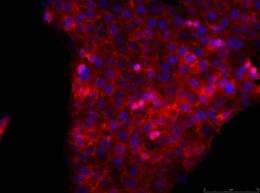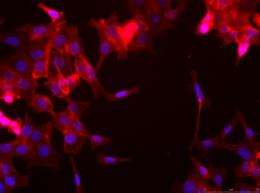Colorectal cancer: Researchers identify genetic markers for metastasis formation


Previously, only a few genes had been associated with the formation of metastases in colorectal cancer. Now, researchers of the Max Delbrück Center for Molecular Medicine (MDC) Berlin-Buch and Charité - University Medicine Berlin, Germany, have identified 115 genes that are disregulated both in the primary tumor and in its metastases. In the future, their findings may help identify patients with aggressive tumors at an earlier stage (Gastroenterology 2009, doi:10.1053/j.gastro.2009.03.041).
The National Cancer Institute estimates that, alone in the United States, 106,100 cases of colon cancer will occur and 49,920 patients will die both from colon and rectal cancer in 2009.
Beginning in glands in the bowel lining, colorectal cancer often remains undiscovered initially. "However, the main problem is not the primary tumor," explained the surgeon and clinical researcher Dr. Johannes Fritzmann, "but the dangerous metastases."
Metastases arise when single cells break off from the primary tumor and spread to other body regions via the blood vessels or the lymphatic system. In colorectal cancer, these cells usually settle in the liver, lungs, or lymph nodes. Since the affected patient seldom feels pain or shows other symptoms, the tumor is frequently not discovered until it has already formed metastases.
To investigate which genetic mutations favor the formation of metastases, the researchers analyzed 150 tissue samples of colorectal cancer patients with and without metastases. The researchers identified 115 genes that are falsely regulated in both the primary tumors and their metastases. In this way, the researchers succeeded in identifying a genetic signature which distinguishes tumors with metastatic potential from those that do not metastasize.
Of the 115 genes the researchers identified, they focused on one gene in particular: BAMBI. They discovered that this gene is more active in metastatic tumors and metastases than in non-metastatic tumors.
"Our investigations show that the particular gene BAMBI is associated with two import signaling pathways and thus promotes metastasis formation," Dr. Fritzmann said. "These signaling pathways (Wnt and TGF-beta) are, among other things, important in the developing embryo."
In the future the researchers want to investigate the role of the other 114 genes more closely, in order to better understand the individual steps of metastasis formation.
Aim - To predict at an early stage whether the tumor will spread
Dr. Fritzmann hopes the research findings will help determine early on whether a tumor has metastatic potential. The doctors could then adapt the therapy accordingly.
Source: Helmholtz Association of German Research Centres (news : web)











